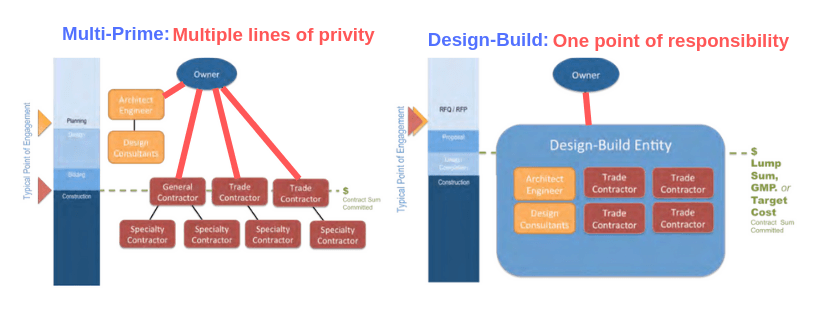“If multiple prime project delivery was cheaper (even by a nickel!) you’d see every Walmart across the country using it.” So says Jon O’Brien, with Pennsylvania’s Keystone Contractors Association, at this month’s industry discussion on the state of Pennsylvania’s design and construction law. Keystone Contractors have teamed up with DBIA, AIA-PA, and the Construction Owners Association of America (COAA) to improve Pennsylvania’s project outcomes by advocating for change in one of the only states that still requires multiple prime delivery.

Design-build delivery is technically allowed under Pennsylvania law but effectively prohibited by its Separations Act (enacted in 1913) which requires multiple prime contracts for the plumbing, heating, ventilating, and electrical work. Advocates of the law, as it currently stands, contend that this structure ensures sub-contractors aren’t mistreated, but as many reported at this event, separate prime contracts leave too many cooks in the kitchen and too much responsibility on the owner in contract management.
In 2017, DBIA joined a coalition of industry groups who agree owners need more options than just multiple prime project delivery. The group has been working to write and introduce legislation that would allow owners to continue to use multiple-prime project delivery, but also allow for single-prime design-bid-build, CMAR and design-build. The legislation has garnered verbal support from both Democrats and Republicans and the issue was also supported by Secretary of the Department of General Services, Curt Topper during last year’s budget negotiations.
Advocates for change in Pennsylvania met in Harrisburg in early December to lay out the case for change in 2019. DBIA State/Local Legislative Affairs Director, Richard Thomas, presented the latest project delivery research, including research by FMI and the Pankow Foundation that was presented at DBIA’s Annual Conference & Expo in November. This research found that the best performing projects had more collaborative teams and greater group cohesion; a characteristic which you find in projects where there is less separation between team members. Pennsylvania panelists highlighted project examples to demonstrate this point. The message was one design-builders espouse often: when project team members are not ultimately responsible to a collective goal, projects will miss key deadlines and run over price.
It’s clear — project delivery in Pennsylvania is changing. A diverse group of stakeholders are mobilized to provide more freedom in project delivery options because while Pennsylvania used to be one of several states in the region requiring multiple prime project delivery, it now stands alone. We concluded the session with a question of how to carry this fight into 2019 and the message was clear: educate, educate, educate. With several legislative staffers attending this event, we’re off to a great start toward that goal.
